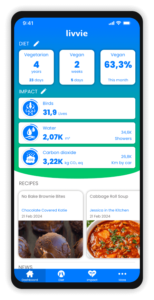Save Water With a Vegetarian or Vegan Diet
Written by Johanna van Langen
Published 10 October 2024
Water is one of Earth’s most vital resources and water scarcity is a critical environmental and societal challenge. Our food system heavily strains global water supplies through overuse, pollution, and environmental degradation, with animal agriculture as a major contributor.
Switching to plant-based foods is one of the most effective ways to reduce your water footprint and protect the natural water cycle. In this article, you’ll learn how a vegetarian or vegan diet can save water, reduce pollution, and protect freshwater resources.

Calculate how much water you save with your diet
Why Saving Water Is Important
Water is essential for sustaining human health and our food system, as well as protecting ecosystems and biodiversity. Yet, water availability is limited and increasingly strained by overuse, environmental degradation, and climate change.
1. Fresh Water Availability Is Limited
Fresh water is one of our most vital resources, but its availability is limited. Although 71% of the planet’s surface is covered in water, only 3% of that is fresh water, most of which is locked away in glaciers or deep underground. This means that only a small fraction is easily accessible for human use.
Earth’s natural water cycle continuously replenishes freshwater sources such as rivers and lakes, but at a slow and limited rate. We must therefore treat fresh water as a finite natural resource. Unfortunately, we currently exploit and disrupt freshwater resources beyond their capacity with severe consequences for society and the environment.
2. Water Scarcity Is a Societal and Geopolitical Issue
Water scarcity isn’t just a future problem and already affects human health and welfare today. You’ve probably noticed frequent reports of droughts, water shortages, and water crises in the news. Currently, around 2 billion people lack access to safe drinking water, and nearly half of the world’s population faces water scarcity. This lack of access to clean water affects human health through increased risk of dehydration and infection due to waterborne diseases and inadequate sanitation.
Agriculture, which consumes 70% of global water withdrawals, is particularly impacted as water is crucial to grow crops. Due to climate change, many regions face more frequent and severe droughts that threaten crop yields and therefore food security. Currently, 2,3 billion people face food insecurity, a figure that is likely to increase as water resources become more strained.
Persistent water shortages can lead to geopolitical conflicts, especially when upstream countries control access to shared freshwater sources through infrastructure like dams. This can disrupt water supplies for downstream nations, potentially causing serious environmental, economic, and social challenges. By 2030, experts predict that up to 700 million people could be forced to migrate by droughts and lack of water. These numbers will only rise as populations grow and climate change continues to intensify.
3. Saving Water Protects the Environment
The consequences of water scarcity extend beyond human needs as it also has a devastating impact on the environment, wildlife, and biodiversity. Overexploitation of natural freshwater resources affects the biodiversity of ecosystems that depend on them. In addition, droughts are linked to an increase in wildfires, which have caused 30% of global deforestation in the last decade. Forests play a critical role in the global water cycle and when they are destroyed, so is their capacity to capture and store water, further exacerbating water shortages.
How Vegetarian and Vegan Diets Save Water
Switching to a vegetarian or vegan diet is one of the most effective ways to save water. Animal agriculture is highly resource-intensive, using large amounts of water, primarily to feed livestock. Plant-based foods consume much less water, making them a more sustainable choice. By eating vegetarian or vegan, you can substantially reduce your water footprint and help protect freshwater resources in several ways.
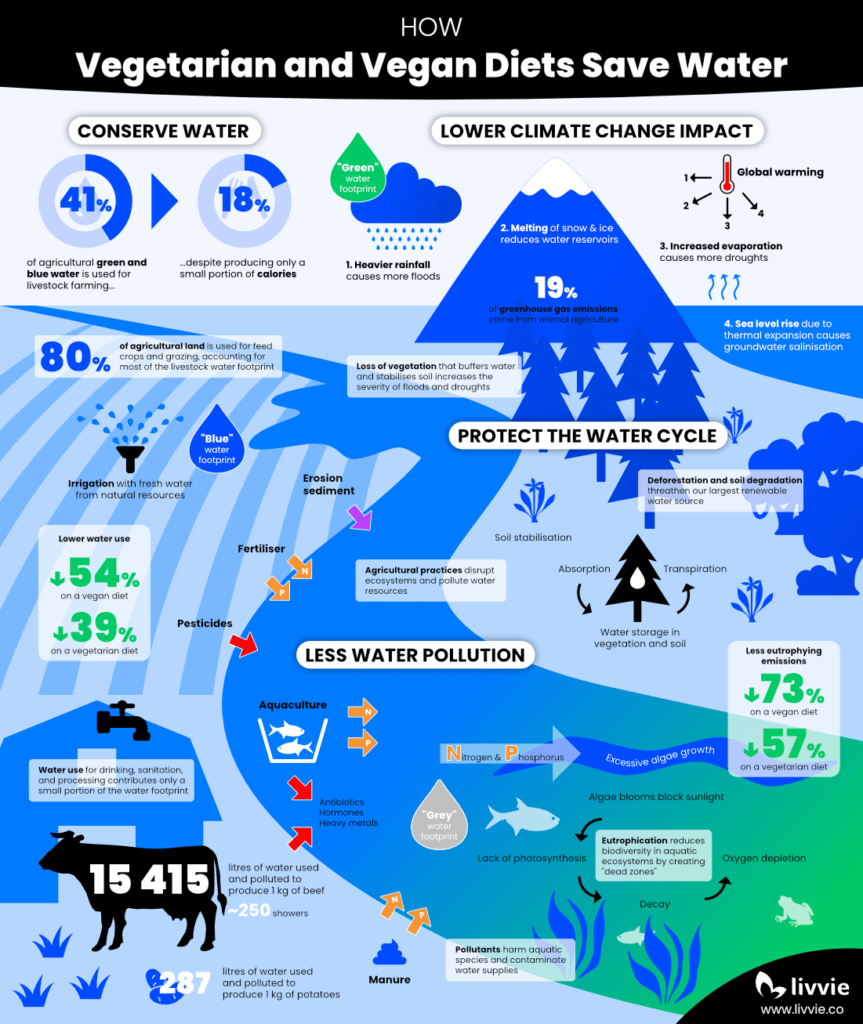
1. Lower Water Consumption for Food Production
The main reason a vegetarian or vegan diet saves water is because plant-based foods require far less water to produce compared to animal-based products. Agriculture is the primary consumer of fresh water and accounts for 70% of global withdrawals. Animal agriculture uses this water inefficiently and consumes 41% of agricultural water despite producing only 18% of global calories. This high dependence on water is mainly due to the large amounts of land for grazing and growing feed crops used for meat and dairy production.
Most pastures and cropland depend on rainwater that is captured in the soil and is also called “green water”. Although this is a sustainable way of using water, these agricultural systems are very sensitive to fluctuations in weather. Harvests from rainfed land are particularly under pressure due to climate change which changes rainfall patterns and causes droughts.
Irrigation has enabled agricultural intensification and increases crop yields. That is why only 18% of agricultural land is irrigated but produces 40% of our food. Irrigation depends on withdrawing so-called “blue water” from natural resources such as rivers, lakes, and groundwater. Blue water is also used in the supply chain of animal-based foods beyond the production of feed. Water is used in livestock facilities for drinking and sanitation, as well as the processing steps towards an edible food product.
The need for land and feed is the main reason for the massive water use of meat and other animal-based foods. For instance, it takes 14.964 litres of water (14.414 green, 550 blue) to produce just 1 kilogram of beef, equal to 250 showers. Plant-based foods such as vegetables, grains, and legumes require much less water. For example, the production of 1 kilogram of potatoes uses only 224 litres of water (191 green, 33 blue), or 67 times less than beef. With a vegan diet, you can lower your diet’s water consumption by 54%, or by 39% on a vegetarian diet.
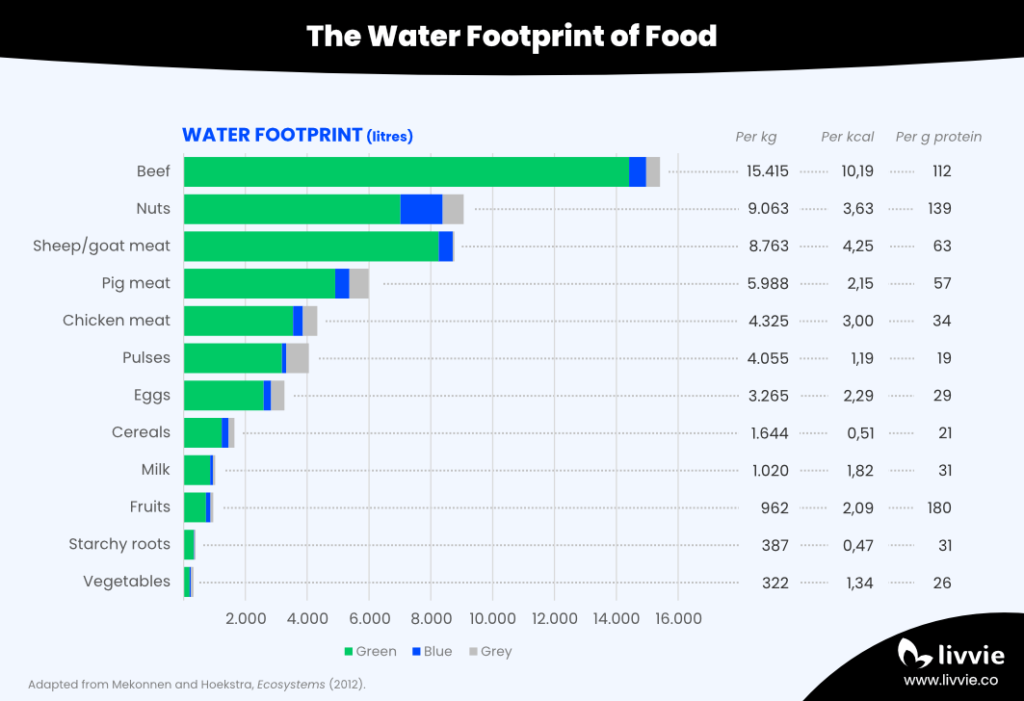
2. Less Pollution of Water Resources
Beyond water consumption, the production of meat and other animal products is responsible for water pollution. Water pollution is quantified as “grey water”, representing the amount of water needed to dilute pollutants to acceptable levels. Animal farming has a large grey water footprint due to runoff from fertiliser, manure, and other pollutants used in raising livestock. These pollutants can contaminate rivers, lakes, and groundwater, negatively affecting ecosystems and human health. The grey water footprint of beef is 451 litres per kilogram, compared to 63 litres per kilogram of potatoes.
Eutrophication
One of the most damaging environmental impacts of animal agriculture is eutrophication, caused by runoff from fertiliser and manure. Fertiliser and manure support plant growth by enriching the soil with nutrients, including nitrogen and phosphorus. These nutrients enter surrounding water bodies and promote excessive algae growth. These algae blooms block sunlight, preventing photosynthesis and depleting oxygen levels in the water, leading to the death of aquatic species.
This eutrophication process is harmful to biodiversity in freshwater and marine ecosystems and makes water unsuitable for human use. Vegetarian and vegan foods produce less eutrophying emissions and can lower the eutrophication potential of your diet by 57% and 73%, respectively.
Other pollutants
Besides nutrient runoff, animal farming introduces other pollutants into water systems. Livestock and fish farming waste often contains residues from antimicrobial, hormones, and heavy metals. Additionally, pesticides used to grow feed crops can kill a broad range of organisms. These chemicals can leach into nearby waterways, contaminating both surface and groundwater. Such pollutants not only harm aquatic biodiversity but also pose risks to human health by entering drinking water supplies. A particular concern is the development of antimicrobial-resistant pathogens, which can thrive in polluted water sources and spread to humans.
These pollutants can persist in the environment and accumulate over time, degrading water quality for both current and future generations. Plant-based agriculture causes less pollution and by eating vegetarian or vegan food more often, you can protect freshwater and marine ecosystems from harmful contaminants.
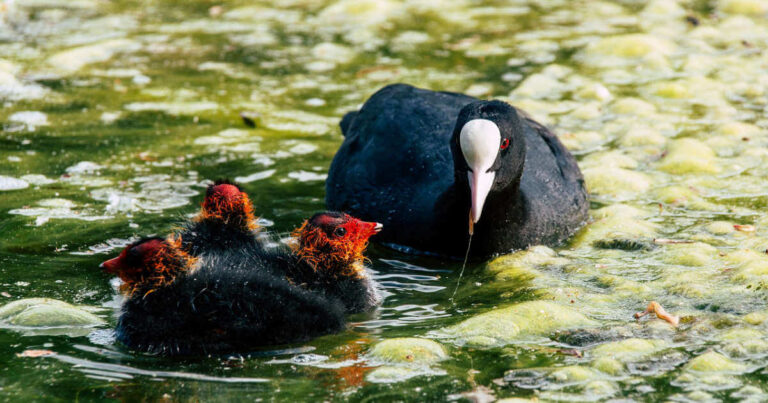
3. Protect the Water Cycle of Ecosystems
A vegetarian or vegan diet not only reduces your water footprint, but also protects the natural water cycle by preventing deforestation and soil degradation. The production of meat and other animal products requires vast amounts of land, leading to deforestation, soil erosion, and the destruction of natural ecosystems that are essential for Earth’s water cycle.
Animal agriculture is the leading driver of deforestation to create grazing land and grow feed crops like soy and corn for livestock. Currently, 80% of all agricultural land is used for livestock farming, placing immense pressure on natural ecosystems.
Forests and healthy soils regulate water as they filter, store, and transpire water, prevent erosion, and replenish groundwater supplies. Forest ecosystems account for the majority of renewable fresh water and help maintain stable supplies throughout the year. Deforestation and land use for animal agriculture reduces the capacity of forests to buffer and store water, threatening human water supplies.
When natural vegetation is removed for feed crops or livestock grazing, the exposed soil becomes vulnerable to erosion from wind and water, causing sediment runoff into rivers and lakes. This disrupts and pollutes freshwater ecosystems, harming biodiversity and making these waters less suitable for irrigation and human consumption.
Plant-based foods require far less land and by eating vegetarian or vegan regularly, you help protect ecosystems that play a vital role in the natural water cycle.
4. Reduced Impact of Climate Change
Climate change poses a serious threat to global water supplies, and adopting plant-based foods can help mitigate its impact. Our food system contributes one-third of greenhouse gas emissions, primarily driven by livestock farming. Vegetarian and vegan diets have a much lower carbon footprint and enhance the resilience of the environment and society against climate change.
Climate change affects the Earth’s water cycle and resources in several ways. Rising temperatures accelerate the melting of glaciers and snow covers, which serve as important freshwater reservoirs that buffer water supplies across seasons. Meanwhile, rising sea levels from thermal expansion of oceans impact groundwater through salinisation. Global warming also leads to more frequent and severe extreme weather events that disrupt freshwater supplies. Increased evaporation reduces water availability from rivers, lakes, and groundwater, causing droughts. At the same time, a warmer atmosphere holds more moisture, resulting in heavier rainfall and an increased occurrence of potentially disastrous floods that can pollute water supplies. These effects disrupt local water cycles, making some regions more prone to droughts and others to floods.
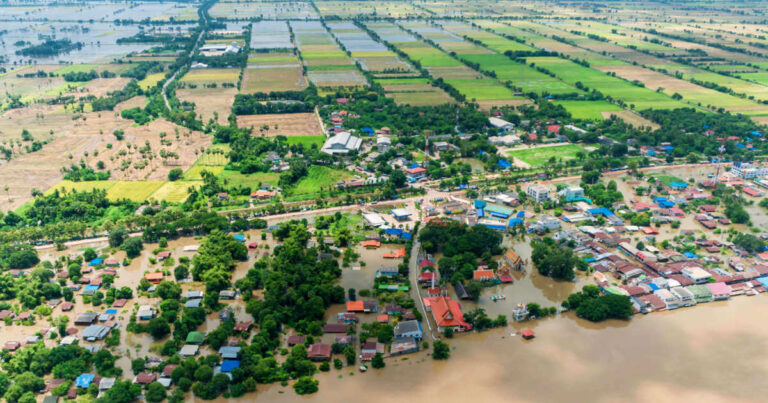
Deforestation and unsustainable land use for livestock farming worsen the impact of climate change. The loss of stabilising vegetation increases erosion and reduces the land’s ability to absorb water during heavy rainfall and release it during heatwaves.
By reducing meat consumption or eating more vegan food, you help lower greenhouse gas emissions and protect water resources from the damaging effects of climate change.
Save Water By Eating Vegetarian or Vegan Food
Incorporating more plant-based foods into your diet is a powerful way to reduce your water footprint and preserve freshwater resources. By eating vegetarian or vegan, you not only save water but also prevent excessive pollution and environmental destruction associated with animal agriculture. This is how small changes in your diet can help conserve water supplies, protect the natural water cycle, and mitigate the damaging effects of climate change.
Whether you eat less meat or adopt a vegetarian or vegan lifestyle, your food choices can promote sustainable water use. Calculate how much water you save with your diet with the Livvie diet impact calculator.
Share this blog post to inspire others to lower their water footprint with sustainable food choices.
Track Your Impact
Inspire your vegetarian or vegan food choices by calculating your impact on 22 parameters.
